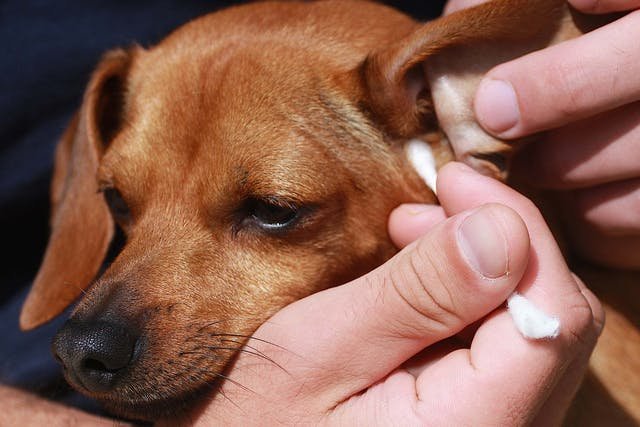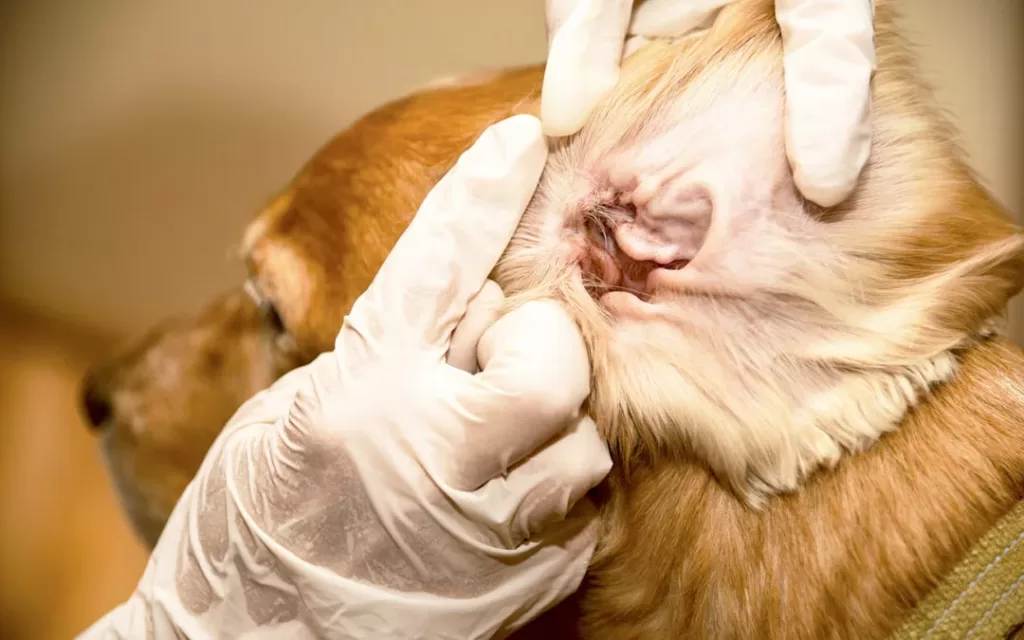A dog ear infection is very common and most pets are prone to ear infections – especially those with long, floppy ears.
Because of this, many dog owners are well aware of the symptoms of dog ear infections.
Common symptoms of dog ear infections are:
- Excessive itching and scratching at the ear
- Head shaking, especially when it looks awkward or unnatural
- Swelling and redness around the ear canal
- Scratching at the affected ear
- Abnormal discharge and odor
- Scratches or crust on the skin in the ears
The dog’s ear canal is much more vertical than the human ear canal.
These L-shaped bacteria are more likely to have fluid and disruption from yeast or ear mites — all of which can lead to infection.
There are 3 sorts of dog ear infections:
- First Goes Otitis externa, which usually affects the outer part of the ear
- Otitis media affects the middle part of the ear canal and is usually secondary to up to 50% of cases of chronic otitis externa
- Otitis Interna refers to an infection of the inner ear, which can lead to neurological damage
Dog ear infection can be a serious condition that can lead to hearing loss or facial paralysis.
Also Read: Red Sable German shepherd Puppy Vs Belgian Malinois: A Quick Look
These serious problems are essential to prevent infection and to be treated as soon as symptoms appear in your pet.
Care and management of dog ear infections include cleaning, medications, and aftercare.
Sometimes the cure is important and it should be quick! So, let’s examine the way to treat ear infections without getting to the vet because as we all know, this is often not a favorite place for our puppies!
Other 3 types of ear infections and causes in dogs
Otitis media is caused by a variety of organisms, including bacteria, yeast, and worms.
Yeast infection in dog ears: Malassezia organisms are single-celled fungi that are usually present in small amounts on dog skin. However, they can multiply. This type of infection is very common in dogs.
Bacteria: If your dog’s immune system is damaged, it can also infect your ears.
Worms: Ear mites (Otodectus sinusitis) are parasites, so your pet can be directly infected by another animal that has infected them.
What Causes Dog Ear Infection?
Many factors can trigger your dog to develop ear infections, such as genetics, lifestyle, and sensitivity to allergens.
Some dog breeds, e.g. People with ear infections are at risk for ear infections because these ears trap moisture.
A dog that lives in a very rainy environment or prefers to bathe will also develop more ear infections for the same reason mentioned above.
Moisture is the number one enemy for dog ears!
A dog with an allergy (environment or food) is also more prone to ear infections because the immune system is busy fighting allergens.
How to know if your dog has an ear infection?

Common symptoms of ear infections in dogs are scratching of the ears and shaking of the head. Do you think your dog has an ear infection?
To detect an infection in your dog’s ears, you should pay attention to the following signs:
- Constantly shaking its head
- Scratching the ear
- The head is tilted to the side
- Stinky ears
- Significant discharge in the ears
- The energy is reduced
- Red / warm ears
- ‘Cauliflower’ ears
when is a dog ear infection an emergency?
If your dog’s head is bent or sounds less than normal, the infection may have gone into the middle or inner ear and the tympanic membrane may have ruptured. Hence it is a more urgent situation.
A swollen, red, warm ear is also of more concern because it could be an ear hematoma.
Such symptoms should be discussed with the veterinarian.
Will dog ear infections go away on their own?
Most often, a dog ear infection does not go away on its own. A properly-knowledgeable pet owner or veterinarian is needed to diagnose all types of otitis infection and deafness.
If the eardrum is cracked, some cleaners and medications can be toxic to the middle ear.
How To Treat My Dog Ear Infection Naturally At Home?

Many dog owners are looking for a home remedy for dog ear infections.
In case of minor ear infections, we suggest natural products to help your dog at home. We suggest a cleansing technique, that is peroxide or apple vinegar, and eventually, a treatment supported with coconut oil.
If your dog is showing the first signs of an ear infection, this product is for him.
Homeopathy product ear infection can help your dog. As a foster mother, you want to help relieve the itching in your furry partner’s ears and reduce the redness associated with inflammation.
This product can also be used in the case of liquid or thick secretions in the infected ear of a dog and the case of ear wax.
This natural product can also be used for many species of animals, including cats.
Home remedies for ear infections in dogs, without prescriptions
Hydrogen peroxide
This technique, commonly known, is controversial. Some veterinarians see this as an essential product as a good ear cleaning agent. Others find it dangerous to use it.
It is advisable to mix a portion of peroxide in water to kill the bacteria in the ear and use the mixture to clean the soaked cotton wool.
Peroxide also attacks the good bacteria in the ear, so use it sparingly. Also, in the case of yeast infection, this product can cause further inflammation. Due to its chemical action, peroxide moistens the ear, which can technically lead to further infections.
Although some people recognize its effectiveness, monitoring by an animal health professional is always recommended when using this method.
Apple cider vinegar
This natural product is recommended by some as a cleanser, antifungal, and antibacterial agent.
Some parts of apple cider vinegar contain acetic acid. This compound is also found in many commercial ear cleaners.
Dip one end of a cotton ball into warm paraffin, pausing between layers to allow them to dry.
Be careful though, this remedy can be painful in cases of redness in the ears. Use sparingly.
Coconut oil treatment
Using this remedy you will have to unleash your talent as a chef!
You can follow the below recipe:
Mix 2 tablespoons coconut oil with the garlic over low heat, creating an amazing antibacterial compound!
You can use this cooled mixture to clean your dog’s ears, again with cotton wool or gauze.
However, although ear infections are very common in dogs, they should be taken seriously.
If your dog shows signs such as shaking his head, scratching his ears, or smell, use our natural remedies or other treatments to get relief from his ear infection symptoms.

